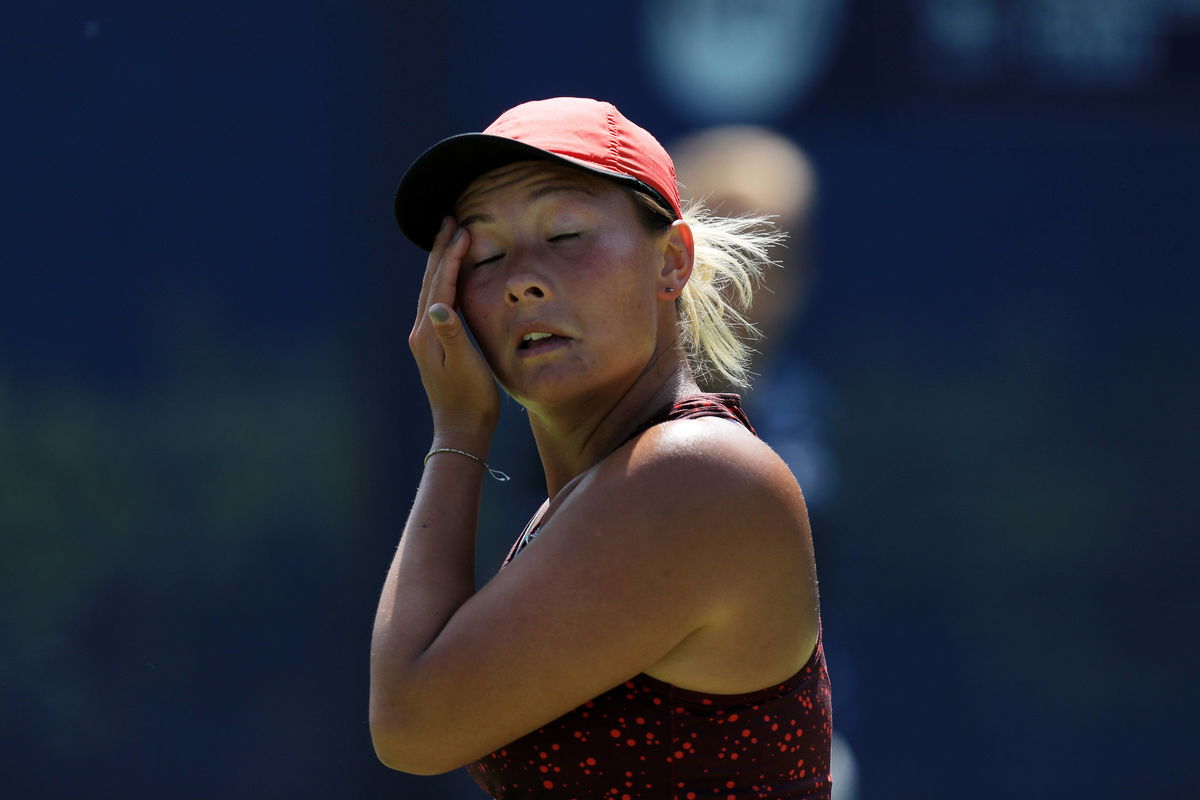
Imago
10th June 2018, Nottingham Tennis Centre, Nottingham, England; The Nature Valley Open Tennis Tournament; A dejected Tara Moore of Great Britain misses a forehand against Elena-Gabriela Ruse of Romania PUBLICATIONxINxGERxSUIxAUTxHUNxSWExNORxDENxFINxONLY ActionPlus12035321 ShaunxBrooks

Imago
10th June 2018, Nottingham Tennis Centre, Nottingham, England; The Nature Valley Open Tennis Tournament; A dejected Tara Moore of Great Britain misses a forehand against Elena-Gabriela Ruse of Romania PUBLICATIONxINxGERxSUIxAUTxHUNxSWExNORxDENxFINxONLY ActionPlus12035321 ShaunxBrooks
The tennis world has been on high alert lately when it comes to anti-doping rules. From big names like Jannik Sinner and Iga Swiatek being roped into testing controversies, the spotlight has only grown harsher. But few stories are as tangled or as devastating as that of Tara Moore. After a years-long battle over contaminated meat, lab findings, and bureaucratic reversals, the former British No. 1 doubles player has finally spoken out. And she’s not mincing her words.
Watch What’s Trending Now!
In June 2022, Moore was provisionally suspended after testing positive for anabolic steroids: nandrolone and boldenone at a tournament in Colombia. She maintained from the beginning that she had never knowingly taken a banned substance, and an independent tribunal later agreed. Their verdict? Contaminated meat was the likely culprit, and Moore had no fault or negligence.
ADVERTISEMENT
It should have been the end of a nightmare that had already cost her 19 months of her career. But the International Tennis Integrity Agency (ITIA) wasn’t done. They appealed the ruling to the Court of Arbitration for Sport (CAS), which has now ruled in their favor, nullifying the original decision and reinstating a four-year ban. “After reviewing the scientific and legal evidence, the majority of the CAS Panel considered that the player did not succeed in proving that the concentration of nandrolone in her sample was consistent with the ingestion of contaminated meat,” the court said.
Tara Moore also filed a counter-appeal, but that, too, was dismissed. On Sunday, Moore took to social media to share the emotional cost of the ordeal and her refusal to let it define her. “To be innocent and to have to prove that is an incredibly gruelling process. Firstly, you’re trying to figure out what these things are, secondly, you are figuring out how and why these things got into your system. If you are innocent you don’t just know straight away. You have to go through everything you’ve done and eliminate what it can’t be, until you settle on something it most likely is. Even then, you are presumed guilty and have fight for your life against someone that has more money and resources than you,” Moore said in a statement.
ADVERTISEMENT
“The last three-and-a-half years have broken me into so many pieces. As my family and friends have scrambled to pick up the broken shards of me, they’ve glued me back together in the form of a different person.” Her words don’t just express grief, they seethe with frustration over a system she says has failed her. “I don’t need a panel to tell me I’m innocent. I know the integrity I bring and I know I am innocent. I believe everyone over the past couple of years can see how subjective this process is. I have been the underdog. I have had my life as I knew it ripped away from me because the organisations and people in power failed to do what was right. They may have taken my fight away on the court, yet my fight is not over, not for me or others like me.”
ADVERTISEMENT
She further stated, “The anti-doping system is broken. I am proof of this. We need to fix it. Not for me as it’s too late, but for future players who find themselves in this unfortunate situation. I have so much more to say when the time is right.”
Statement: pic.twitter.com/FrTaOeDlQK
— Tara Moore (@TaraMoore92) July 20, 2025
The ban is retroactive, subtracting the time she already spent under provisional suspension, meaning Moore won’t be allowed back on the court until early 2028, by which time she’ll be 35. That’s a long hiatus in a sport where years off the tour often turn into quiet retirements.
ADVERTISEMENT
Tara Moore had also once questioned Jannik Sinner’s case in relation to hers.
ADVERTISEMENT
When Jannik Sinner’s doping case made no “sense” to Tara Moore
The British doubles specialist is calling out what she sees as a glaring double standard in tennis’ anti-doping process.
Jannik Sinner tested positive for clostebol twice during the Indian Wells swing in March. Despite the presence of a banned substance in both samples, the ITIA cleared the World No.1, citing no fault or negligence. CAS initially appealed the decision, but before it reached court, a settlement was reached, and Sinner was quietly handed a three-month ban.
ADVERTISEMENT
The contrast wasn’t lost on Moore while both their investigations were ongoing in different ways.“I guess only the top players’ images matter,” she wrote on X. “I guess only the independent tribunal’s opinion on the top players is taken as sound and right. Yet, they question them in my case. Just makes no sense.”
ITIA CEO Karen Moorhouse, however, has made it clear that all cases are treated fairly. She said, “For the ITIA, every case is considered according to the individual facts and circumstances. Our bar for appealing a first instance decision is high, and the decision is not taken lightly.”
But for Tara Moore, the contrast in outcomes has raised uncomfortable questions about consistency in the system. Her case may be closed, but the debate it fuels is far from over.
ADVERTISEMENT
ADVERTISEMENT
ADVERTISEMENT
ADVERTISEMENT
